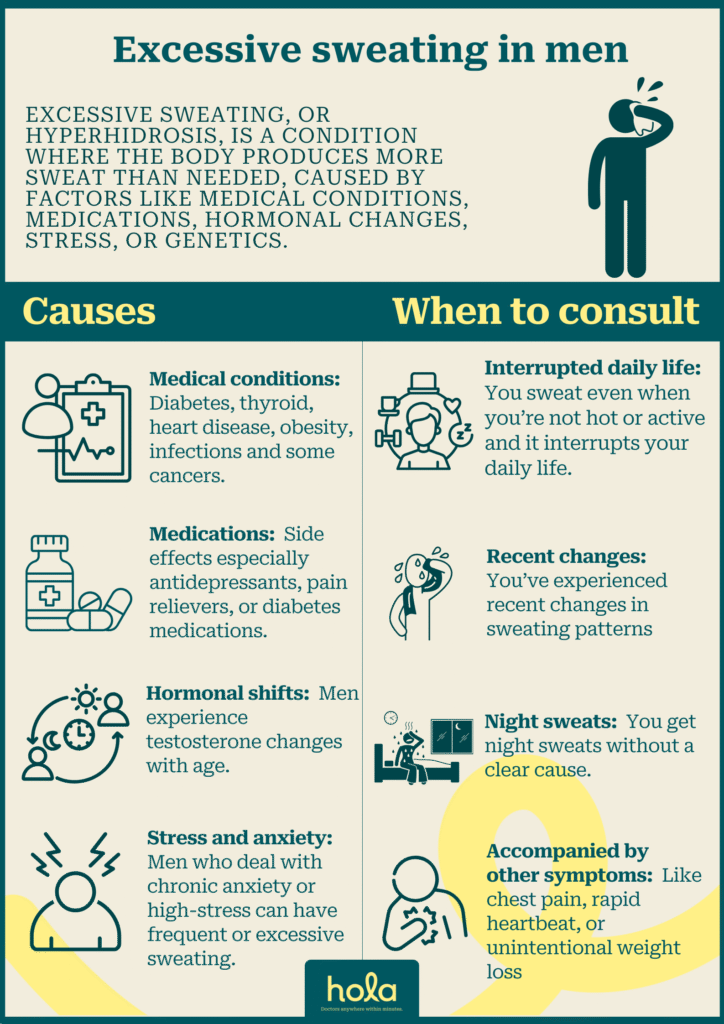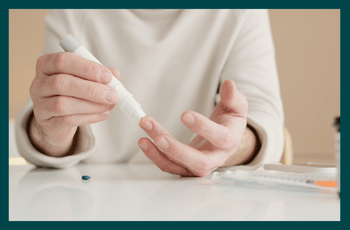Causes of excessive sweating in males: Ask a GP
Written by Dr Nelson Lau, MBBS FRACGP, GP & Digital Health Specialist.

Contents

Everyone sweats. Whether you’re jogging through the park, stressing before a big presentation, or just caught up in a heatwave, sweating is how your body cools itself down. But what happens when you’re sweating a lot—as in, way more than feels normal—even when you're not doing anything particularly intense?
For many men, excessive sweating can feel embarrassing, uncomfortable, or just downright confusing. So, is it just a quirk of your body, or is it a sign that something deeper might be going on?
In this post, we’ll walk through what it means when men experience heavy sweating, when it might be time to see a doctor, and what your options are for diagnosis, treatment, and even prevention.What is excessive sweating?
The medical term for this condition is hyperhidrosis—and it’s more common than you might think. Hyperhidrosis is essentially when your body produces sweat well beyond what’s necessary to regulate your temperature. There are two main types:- Primary (focal) hyperhidrosis: This typically starts in adolescence or even earlier. It often affects specific areas like the armpits, hands, feet, or face. The cause is often unknown, though genetics likely play a role.
- Secondary (generalised) hyperhidrosis: This one’s usually a symptom of another medical issue—such as an infection, thyroid problem, or side effect of a medication—and tends to affect larger areas of the body.
Also read: Night sweats causes explained with treatments
What causes men to sweat excessively?
A wide range of factors can contribute to hyperhidrosis in men. Some are harmless, while others might be red flags worth checking out:
Medical conditions
Certain illnesses can mess with your body’s thermostat. These include:
- Diabetes
- Hyperthyroidism (overactive thyroid)
- Heart disease
- Obesity
- Infections
- Certain cancers
These conditions usually cause secondary hyperhidrosis, and the sweating often comes on suddenly or affects your whole body.
Medications
Some medications list sweating as a side effect—especially antidepressants, pain relievers, or diabetes medications. If you started a new prescription around the time the sweating began, it’s worth bringing it up with your doctor.
Hormonal changes
We often associate hormone shifts with women (like menopause), but men experience them too—especially as testosterone levels change with age. These shifts can trigger night sweats or facial sweating.
Stress and anxiety
Sweating is one of the body’s first responses to stress. In men who deal with chronic anxiety or high-stress environments, this can translate to frequent or excessive sweating, particularly around the face and scalp.
Experiencing these symptoms? Speak with a doctor within 15 minutes.
Facial and scalp sweating in older men
If you’re an older man noticing increased sweating around your face or scalp, you're not alone. This type of craniofacial hyperhidrosis becomes more noticeable with age and can be linked to other age-related conditions like:- Parkinson’s disease
- Type 2 diabetes
- Obesity
- Side effects from medications (especially blood pressure or psychiatric drugs)
Also read: 30 Healthy Habits for Men over 40
When should you be concerned?
So how do you know when to just carry an extra shirt—and when to book an appointment with your GP?
Here are a few signs it’s time to take things seriously:
- You sweat even when you’re not hot or active
- Sweating interrupts your daily life, social events, or work
- You’ve experienced recent changes in sweating patterns
- You get night sweats without a clear cause
- Sweating is accompanied by other symptoms, like chest pain, rapid heartbeat, or unintentional weight loss
How is excessive sweating diagnosed?
If you head to your GP with concerns about sweating, here’s what they’ll likely do:
- Medical history & physical exam: They’ll ask questions about when the sweating started, how often it happens, and where it occurs. This helps determine if it’s primary or secondary hyperhidrosis.
- Blood and urine tests: These helps identify underlying conditions like thyroid problems, infections, or diabetes.
- Specialised sweat tests: Some clinics may use tools like the iodine-starch test to map where and how much you’re sweating.
In many cases, you’ll get a diagnosis pretty quickly. And from there, it’s all about choosing the right treatment path.
Treatment options: From deodorants to injections
Thankfully, there are more options than ever for managing excessive sweating. Here’s a breakdown:
Clinical-strength antiperspirants
These are different from regular deodorants and contain aluminium chloride, which blocks sweat glands. They’re often the first step—and can be surprisingly effective for mild to moderate cases.
Oral medications
Doctors may prescribe anticholinergics, which reduce sweat production. These are helpful but can come with side effects like dry mouth or blurred vision.
Botox injections
Yes—Botox isn’t just for wrinkles. It can also block the nerves that trigger sweat glands, especially under the arms or on the face. Effects typically last 4–6 months.
Iontophoresis
This low-current electrical treatment is especially useful for sweaty hands and feet. It sounds intense, but many people find it life-changing if used properly (although it is contraindicated in individuals with pacemakers, epilepsy, pregnancy, heart conditions, or metal implants in the treatment area).
Surgery
In severe cases, a procedure called sympathectomy may be done. This involves cutting or clamping the nerves that cause sweating—but it's typically reserved for very stubborn cases.
Can it be prevented?
Not always—but you can manage it better with a few lifestyle tweaks:
- Choose breathable clothing (cotton or moisture-wicking fabrics)
- Avoid spicy foods, caffeine, and alcohol
- Practice stress management (meditation, yoga, or therapy)
- Stay hydrated (ironically, this can help balance your body’s cooling system)
And if you’re trying home remedies for a while with no success, don’t be afraid to talk to your doctor.

Online doctor advice: Is it reliable?
There are now many reputable telehealth platforms where you can speak to a licensed GP or dermatologist from the comfort of your home. They can help with initial diagnosis, prescribe medications, and recommend in-person tests if needed.
Just make sure the service and the doctors have the proper certifications before sharing personal health information.
How can telehealth manage excessive sweating in male?
Telehealth makes it easier for men to seek help for excessive sweating without the awkwardness of in-person visits. Through online doctor consultations, registered Australian practitioners can assess symptoms, identify possible underlying causes, and recommend treatment options like clinical-strength antiperspirants or oral medications. They can also issue online prescriptions and, if needed, provide referrals to dermatologists or specialists for further care. Telehealth is especially useful for discussing personal symptoms like hyperhidrosis discreetly, with fast access to advice and follow-up care, all from the comfort of home.
If you’re a man dealing with sweating that seems out of control, know this: you’re not alone, and it’s not something you have to just "live with." Whether it’s your hands, face, armpits, or whole body, excessive sweating can be more than just annoying—it can be a clue that something’s up.
Start by having an honest conversation with your doctor. The sooner you get to the root of it, the sooner you can feel more confident, comfortable, and, hopefully, even a little drier.
What we treat
- Cough
- Nausea & vomiting
- Fever
- Hayfever
- Fatigue
- Sore throat
- Acne
- Hair loss
- Gout
- Eczema
- Rosacea
- Sunburn
- UTI
- Erectile dysfunction
- Contraception
- Morning sickness
- Morning after pill
- Prostate health
- Anxiety
- Depression
- Stress
- Grief & loss
- Antidepressants
- Premature ejaculation
- Asthma
- Blood pressure
- Blood thinners
- Diabetes
- Cholesterol
- Migraines & headaches
- Allergies
- Body ache
- Heartburn & reflux
- Sleep disorder
- Pain relief
- Gastro
Related Articles
Disclaimer
This blog is for general informational purposes only and does not indicate that Hola Health provides all treatments or preventive measures mentioned. It is not intended to be a substitute for professional medical advice. Always seek the guidance of your doctor or other qualified health professional with any questions you may have regarding your health or a medical condition. For emergencies please immediately contact 000. Any medical topics discussed are intended to educate, not to imply availability through Hola Health.

Get affordable healthcare on your terms, with quick access to qualified, Australian-registered telehealth doctors & health practitioners, 24/7, 365 days a year. No more searching for ‘doctors near me‘ – Hola connects you instantly.
Address: 79 St Georges Terrace, Perth WA 6000


Hola Health App
Get affordable healthcare on your terms, with quick access to qualified, Australian-registered telehealth doctors & health practitioners, 24/7, 365 days a year. No more searching for ‘doctors near me‘ – Hola connects you instantly.
Call 000 for emergency or urgent medical help.
Address: 79 St Georges Terrace, Perth WA 6000
© Hola Health, a brand of Packapill Pvt Ltd


 Facebook
Facebook  X
X  Copy Link
Copy Link












